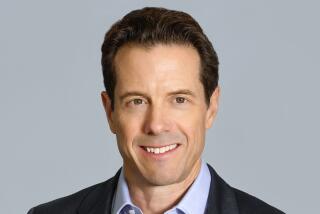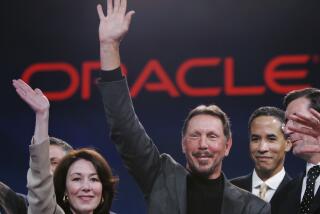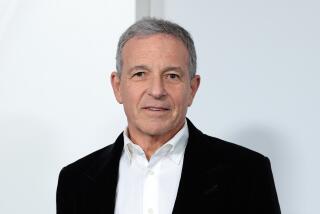Disney Picks Paris Veteran to Run Parks
Walt Disney Co. Chief Executive Michael Eisner on Sunday turned to an American in Paris, plucking a 17-year company veteran to head one of highest-profile--and economically challenged--divisions of the lumbering entertainment giant.
Crossing the Atlantic to silence naysayers who question the depth of his management ranks, Eisner moved quickly to to fill the hole created by the departure Friday of respected theme parks president Paul Pressler and appointed Euro Disney chief James A. Rasulo to be president of Walt Disney Parks and Resorts worldwide.
The appointment of the 46-year-old New Yorker was a surprise as many within and outside the company expected Walt Disney World President Al Weiss to replace Pressler, who announced his resignation Thursday to become chief executive of retailer Gap Inc.
The resignation of one of Eisner’s most loyal lieutenants dealt an unexpected blow to Eisner, who has been feeling the heat from influential board members and investors to improve the company’s earnings and stock price. Eisner also has been under pressure to articulate a succession plan. Although Rasulo has the trust and respect of Eisner’s inner circle of top executives, he was not recruited as a potential successor, a source close to the company said.
Even though Weiss spent his entire 30-year career at Walt Disney World and heads the world’s largest theme park resort, he lacked the international experience that Disney executives singled out in their hiring of Rasulo.
The urbane executive, who is fluent in French and a wine connoisseur, is known as a provocative and passionate leader who understands the cultural nuances of foreign markets, which Disney has come to appreciate after some hard lessons in France. Rasulo is credited with helping transform Disneyland Paris, a onetime financial disaster that was branded a “cultural Chernobyl” by the French elite, into one of Europe’s busiest tourist destinations.
Executives with “global” on their resumes are in big demand as Disney is discovering that it’s indeed a small world after all.
The company is shifting its attention overseas as domestic markets mature. Last spring Disney opened a second theme park at Disneyland Paris and added another theme park in Tokyo. The company also is building a theme park in Hong Kong, set to open in 2006, and has plans for another in Shanghai.
“Jay has been instrumental in making Disneyland Resort Paris the most popular tourist destination in Europe,” Eisner said in a statement. “His vision and extensive experience in the international arena will be invaluable as we continue to grow the business globally.”
Eisner is counting on Rasulo to carry out a daunting task: to help ride the company’s core division through an economic storm. Disney’s theme parks, once the company’s breadwinner, have taken a beating in the last year as the soft economy and last year’s terrorist attacks have pushed vacation bookings down 10%.
In addition to Disney’s 10 theme parks, Rasulo also will oversee the Disney Cruise Line, Disney Regional Entertainment, Walt Disney Imagineering and Anaheim Sports Inc., which oversees the Anaheim Angels baseball team.
In an interview, Rasulo said he intends to draw on his background in international marketing to help alleviate the falloff in foreign travel that has hurt Disney’s domestic theme parks, especially in Orlando.
“This is one of the most exciting challenges of my 17 years with Disney,” Rasulo said..
However, Rasulo downplayed expectations of a quick turnaround in the theme park business. “I’m certainly not going to be able to turn around a fundamental world trend.”
He said he would continue to streamline the division while balancing the needs to invest in future projects.
“Maybe we tilted the balance a little bit toward seeking efficiencies and cost reductions,” he said.
“Disney parks and resorts are fixtures of the landscape, and they certainly depend on the quality of the execution of the Disney brand,” he said. “We’re not going to compromise on that.”
Rasulo said the issue of whether he might be considered a successor to Eisner did not come up in his conversations with Eisner this weekend, nor was that a factor in his decision, he said. After two years as a manager at Marriott Corp., Rasulo joined Disney in 1986 and has held a range of positions in the company. He was head of the Corporate Alliances division from 1993 to 1995 and later became senior vice president of Disney Regional Entertainment, where he had some misfires. He was involved in the development of the Club Disney entertainment centers, which were shuttered in 1999 because of weak sales.
In 1998, Rasulo, who is married and has three children, moved to Paris to become executive vice president of Euro Disney, the holding company for Disneyland Paris, and became the resort’s chairman and CEO two years later.
During his tenure there, Rasulo oversaw a period of massive real estate development and signed four major hotel deals with European operators and hotel chains for the construction of 2,000 rooms on the Euro Disney property and surrounding area. This year he opened a second theme park in Paris, called Walt Disney Studios, where he took great pains to avoid the cultural faux pas of his predecessors. The new studio, for example, prominently includes heroes of French as well as American cinema.
“You’re always better off when you listen to the customer and listen to what they want and continue to evolve and adapt your product constantly,” Rasulo said.
It was a lesson his predecessors learned the hard way after Disneyland Paris (then Euro Disney) nearly went under after its opening in 1992.
In a rescue plan, Disney restructured the park’s $3-billion debt, reduced its equity to 39% and postponed royalty and management fees for several years. Park officials also cut ticket prices and introduced alcoholic drinks and a broader range of food concessions and attractions. The strategy worked, and by 1995 Euro Disney had recorded its first annual operating profit.
Although Rasulo joined Euro Disney several years after the restructuring was underway, he has played an important role in its ongoing turnaround, analyst say.
“Jay’s a smart guy,” said Steve Baker, an Orlando theme park consultant and former Walt Disney World executive. “Disney needs a good manager right now, somebody who knows the busuiness, who can build a team and get the morale up. Jay can do that.”
Former Disney executive John Cooke described Rasulo’s appointment as “very good for Michael [Eisner] because of Jay’s experience in strategic planning and in Europe.”
Several other Disney executives were considered candidates for replacing Pressler, including Disney Cruise Line chief Matt Ouimett and Disneyland President Cynthia Harriss.
“This is great news for our company.... “ Weiss said. “We’re in very good hands.”
Disney did not name a replacement for Rasulo.
On Friday, Disney stock closed down 66 cents to $15.24 on the New York Stock Exchange.
*
(BEGIN TEXT OF INFOBOX)
JAMES A. RASULO
Age: 46
Birthplace: New York
Education: Bachelor’s in economics, Columbia University, 1978; master’s degree, University of Chicago, 1982; MBA, University of Chicago, 1984.
Career: Manager, Marriott Corp.; joined Walt Disney Co. in 1986 in corporate strategic planning; senior vice president of Corporate Alliances; senior vice president of Disney Regional Entertainment; executive vice president and later chairman and CEO of Euro Disney.
Personal: Married; has three children
Highlight: Oversaw turnaround of Disneyland Paris into the top tourist destination in Europe. In January 2001, welcomed the 100 millionth guest to Disneyland Paris, which opened in 1992.
*
Times staff writer James Bates and Orlando Sentinel writer Robert Johnson contributed to this report.
More to Read
Inside the business of entertainment
The Wide Shot brings you news, analysis and insights on everything from streaming wars to production — and what it all means for the future.
You may occasionally receive promotional content from the Los Angeles Times.











